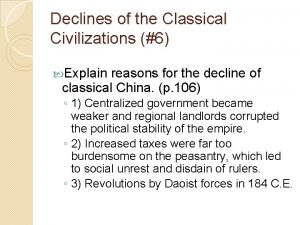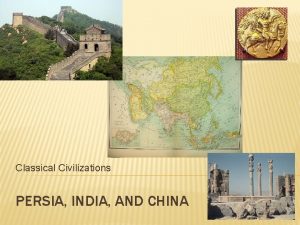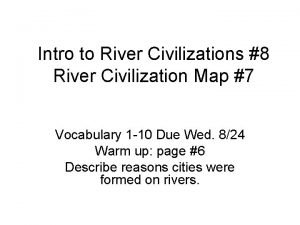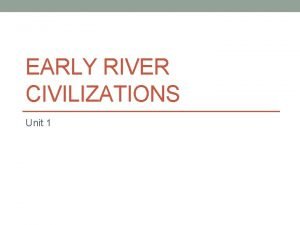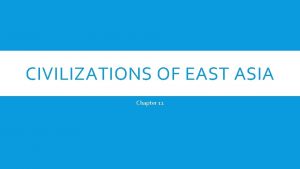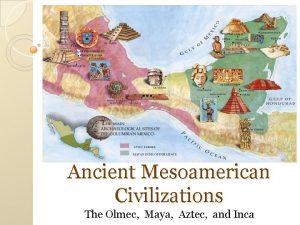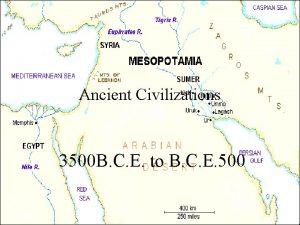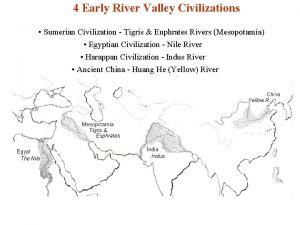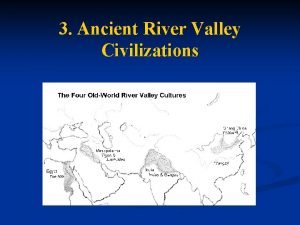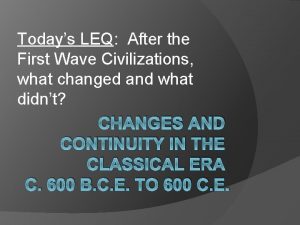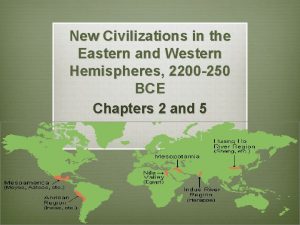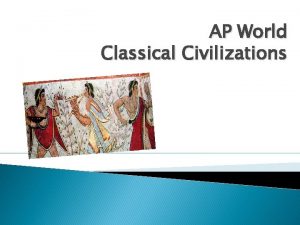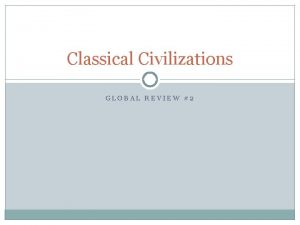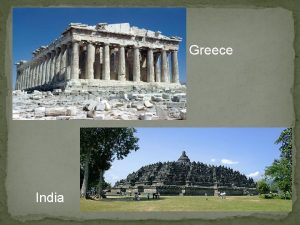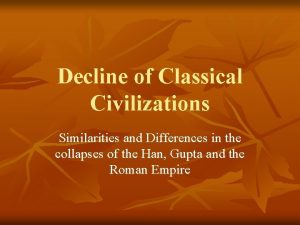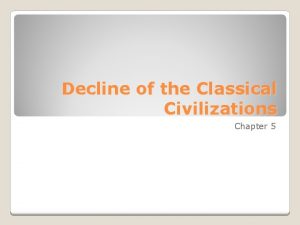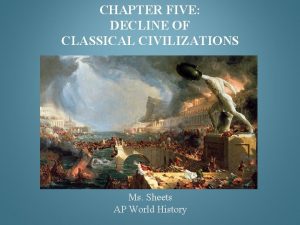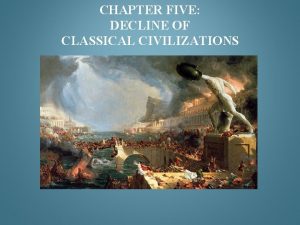Decline of Classical Civilizations Decline in China and














- Slides: 14

Decline of Classical Civilizations

Decline in China and India �Collapse of Classical Civilizations ◦ All or in part ◦ All suffer from expansion in Central Asia �Nomadic Huns invade both

Han Collapse � Decline ◦ ◦ by 100 C. E. Intellectual creativity slows Bureaucratic Corruption Local landlords gain in power Rising social tensions �Peasants over-taxed � Yellow Turbans, 184 C. E. ◦ Daoist revolutionaries � 30, 000 students attack what they see as decadence in society

Han Collapse � Population Collapse ◦ Disease wipes out possibly half of the population ◦ Overall economic decline � Imperial factions form ◦ Civil war weakens society further ◦ Unable to fight off invading Huns � Buddhism spreads, displacing some Chinese religious beliefs

The End of the Gupta Empire � Invasions from 500 C. E. ◦ Probably Huns ◦ Gupta Empire destroyed by 400 C. E. ◦ Invaders integrated into warrior caste � Rajputs groups – regional princes - emerge from these ◦ Small states, emphasis on military virtues � Hinduism gains ground from Buddhism � Islam introduced from 600’s ◦ Muslim invaders in the 8 th century leads to strengthening of Hinduism

Decline and Fall in Rome � Problems facing Rome ◦ Population decline. Why? (we discussed possibilities yesterday) �Plagues wipe out more population �Difficulty recruiting for the Army �Asked Germanic tribes to protect the frontiers ◦ Brutal, arbitrary rulers ◦ Cities shrink �Flight from taxation �Revenues decrease ◦ Pervasive gloom

Decline and Fall in Rome � Effort at Revival: Division of the Empire ◦ Great estates emerge �Landlords gain power at the expense of government ◦ Diocletian (284 -305) �Reorganizes bureaucracy, tax collection, status of emperor. How? ◦ Constantine (312 -337) �New capital, Constantinople �Christianity serves as a unifier

Division of the Empire � Western Empire declines ◦ Economic weakness � Eastern Empire, Constantinople ◦ Becomes center of Roman world � Collapse ◦ Has massive legacy in western imagination ◦ Uneven – Eastern Empire thrives � Invasion ◦ Germanic tribes invade ◦ Welcomed by many Romans


The Early Byzantine Empire � No real “fall” � Shaped by context of late Roman Empire ◦ Autocratic emperors ◦ Greek language � Justinian ◦ Attempt to reconquer Western Empire ◦ Influential codification of Roman laws ◦ Lost Italy and Roman colonies in North Africa

Competition � The Middle East ◦ Parthian rule �Emerges in late Hellenistic period �As far as India ◦ Sassanid Empire �Persian uprising replaces Parthians �Revival of Persian traditions, including Zoroastrianism ◦ Both empires connect east and west �Fall of Rome has little impact on this region

Roman Replacements � North Africa ◦ Regional Kingdoms ◦ Spread of Christianity, but uneven �Coptic church � Western Europe ◦ Greatest disruption �Civilization itself shattered �Cities shrink ◦ Christianity provides structure ◦ Yet, “fall” of Rome noted at the time


The New Religious Map �Rise of World Religions ◦ Disease creates demand for new answers ◦ Buddhism spreads into Asia ◦ Rise of Christianity, Islam ◦ Civilization declines and redirected ◦ Syncretism with earlier beliefs
 What caused the decline of classical civilizations
What caused the decline of classical civilizations The two classical civilizations of ancient india were the
The two classical civilizations of ancient india were the Mayans aztecs incas map
Mayans aztecs incas map Map of river valley civilizations
Map of river valley civilizations Ancient river valleys map
Ancient river valleys map Inca diorama
Inca diorama Chapter 9 lesson 1 early civilizations
Chapter 9 lesson 1 early civilizations Scholargentry
Scholargentry River valley civilization map
River valley civilization map Mesoamerican civilizations timeline
Mesoamerican civilizations timeline 3500 bce means
3500 bce means 4 river valley civilizations
4 river valley civilizations 4 river valley civilizations
4 river valley civilizations Third wave civilizations
Third wave civilizations Mediterranean civilizations location hemisphere
Mediterranean civilizations location hemisphere
